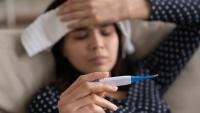Sick Day Management

Understanding what to do on sick days is a very important part of diabetes management. Minor illnesses, such as the flu and upset stomach, often change the body’s need for insulin. As a result, the blood glucose may rise much higher than usual, or it may be lower than target.
High blood sugars during illness can lead to dehydration because they cause frequent urination at a time when you are least inclined to drink large amounts of fluid. Illness can also lead to diabetic ketoacidosis through a buildup of ketones in the blood.
What To Do When You Are Sick
To manage diabetes during an illness, adhere to the following guidelines:
- Insulin must be taken every day, even when you are sick. Your insulin requirements may change on sick days. Infections such as strep throat may require higher insulin doses, whereas illnesses that cause vomiting and diarrhea may require less insulin than usual. Call your doctor to help determine the appropriate insulin dose.
- Carbohydrates must be taken every day, even when you are sick. Try to eat as much of your usual diet as possible. If you cannot, you may drink small sips of fluid containing sugar (sports drink, juice, or regular soda) if your blood sugar is less than 180 mg/dL.
- Check your blood sugar frequently, at least prior to meals, snacks, and bedtime.
- If your blood sugars are elevated (more than 250 mg/dL) and you have ketones in your urine, you need more rapid acting insulin. Call the Berrie Center for recommendations.
- If your blood sugars are low (less than 70-80 mg/dL) you need a carbohydrate-containing food or beverage to keep your blood sugars in the target range.
- Check your urine for ketones if your blood glucose is over 250 mg/dL. Moderate or large ketones decrease the effectiveness of insulin and you will require higher doses of insulin. Ketones can be a sign of insufficient carbohydrate intake, as well as insufficient insulin dosing. Call your doctor’s office if you have moderate or large ketones in your urine.
Danger Signs: Call Your Doctor
Call your Berrie Center doctor immediately at 212-851-5494 if you develop any of the following:
- Vomiting
- Moderate or Large Ketones
- Confused thinking
- Feeling very sleepy
- Shortness of breath
- Other serious/alarming medical problems
Vomiting and Type 1 Diabetes
Vomiting in a patient with type 1 diabetes is a MEDICAL EMERGENCY. Vomiting can be sign of diabetic ketoacidosis (DKA), which is a very serious complication of type 1 diabetes. DKA happens when insufficient insulin leads to a buildup of acid (ketones) in the blood. There can be serious consequences without proper treatment. In DKA, the blood sugar is typically over 200 mg/dl, and there may be a “fruity” smell to the breath.
Causes of diabetic ketoacidosis include:
- Not taking insulin doses as prescribed
- Pump failure
- Infections or other illness
If vomiting occurs and blood sugar is over 200 mg/dl, please dip urine for ketones. If ketones, abdominal pain, or vomiting are present, please call us immediately so that we can help manage the situation and determine if the patient needs to go to the hospital. If the blood sugar is normal but the patient does not look well, is vomiting, or can’t keep any liquids down, please call us.
When you are sick, you still need insulin. Never skip insulin without talking to us.
Food Suggestions
If you are unable to eat your usual meals, it is very important for you to eat some type of food with calories that your body can easily digest and keep down. It is especially important to drink enough fluids such as tea, broth, water, sports drinks, or even ice pops. Sip fluids slowly throughout the day.
The following foods are easily tolerated and absorbed forms of carbohydrate. Each provides 15-20 grams of carbohydrates:
- ½ cup Jell-O
- ¼ cup sherbet
- 1 popsicle
- 5 saltines
- 1 slice bread
- 6 pretzel rings
- ½ cup cooked cereal
- ½ cup cooked rice
- ½ cup regular soda or ginger ale
Make sure you have plenty of supplies, including:.
- CGM supplies, blood glucose test strips, glucometer
- Ketone strips (check expiration date)
- Insulin (rapid and long acting)
- Glucagon (check expiration date)
- Fluids or ice pops, both sugar-free and with sugar
